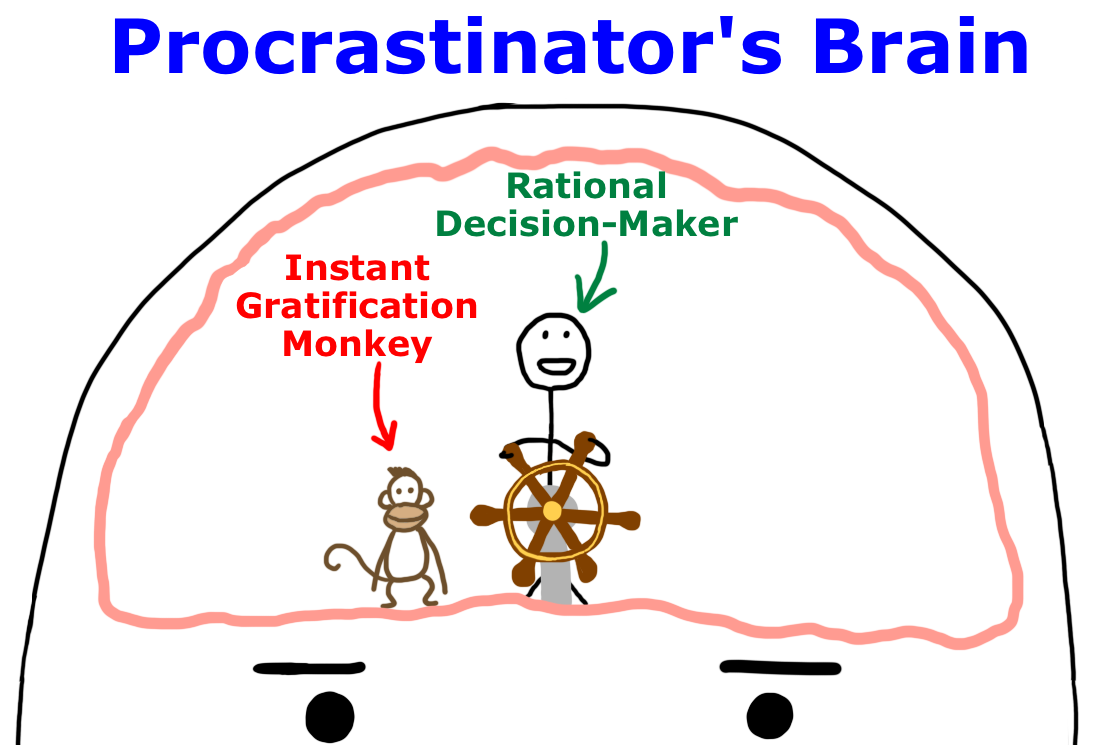The first in our series of pieces about education and how to improve any and every skill you want deals with the most common hurdle the average student faces — procrastination.
Recognising the problem
Every procrastinator has, at some point in their life, heard the wonderfully helpful advice “stop procrastinating”, “concentrate” or “just do it”.
But if avoiding procrastination was that easy then surely everyone would have kicked the habit by now…
Commanding someone to stop procrastinating is about as useful as an instructing someone with a broken leg to run it off.
There is no point trying to tackle the symptom until you appreciate the cause.
A lesson from a pro
Tim Urban (a world class procrastinator and a pretty good blogger too) has delved into the mind of the average distracted person. He emerged with what he imagines to be an accurate depiction of its inner workings:

Two halves of the brain in harmony — Tim Urban waitbutwhy.com
The instant gratification monkey and Rational Decision-Maker
The instant gratification monkey and Rational Decision-Maker (pictured above) symbolise two parts of the brain which Tim’s claims are battling for control. The Rational Decision-Maker attempts to guide you towards productivity, the Instant Gratification Monkey delays you with distraction. Your own personal primate tempts you with the joys of a YouTube spiral, a Netflix binge or even a Wikipedia page that you’ve managed to land on and suddenly it’s two hours later and you feel the guilt of having accomplished nothing.
If these nuanced characterisations weren’t enough for you however there’s one more friend to introduce: the Panic Monster.

The Panic Monster in action — Tim Urban waitbutwhy.com
The Panic Monster, Tim explains, emerges as deadlines loom. It is the reason why our productivity suddenly spikes when we realise we only have about 4 hours to write that 2000 word essay we’ve been putting off for weeks. That feeling of impending doom that accompanies our Panic-y friend allows the Rational Decision-Maker to finally take control and steer us towards our goal.
Is it believable?
Tim’s ideas are really compelling and often well founded, you should definitely check out his TED talk the next time your monkey takes control, but perhaps you’re not 100% sold on a few cartoon creatures…
But… professionals and academics in the field of psychology agree with a lot of what Tim has eloquently doodled. Our desire for dopamine leads to those short term distractions which give us a quick fix, while any daunting task in front of us produces the same ‘fight or flight’ response which we would experience staring down a wild bear.
Have you ever tried writing an essay while facing a bear?
How to beat procrastination
An immediate fix is not always an option for chronic procrastinators (about 20% of the population by some estimates) but whether you’re part of that 20%, or the 100% of people who occasionally find themselves off-course, there are things you can do to help.
Understand where the urge to procrastinate comes from
By realising what’s making you lose focus you can manage your work and limit stress factors, instead of being controlled by them.
Manage your Panic Monster
Staring down a bear is never easy, but splitting that bear into chunks can make things a whole lot easier. There’s nothing scary about a single furry foot and a growling face is much friendlier if you take it one tooth at a time.
Pick apart a daunting task with a plan, choose a section of that plan and deal with it one piece at a time, don’t try to take on the bear all at once.
NOTE: sometimes making the plan is a scary process, try making it smaller and more manageable too!
Appreciate yourself
Completing a task is an achievement and even the little ones deserve a feeling of success. Take the time to be proud of what you’ve done.
Appreciating your achievements keeps you sane and motivated but it also reminds you that you can complete the task in front of you. Low self-confidence feeds into the anxiety that prevents you from tackling problems rationally. Give yourself the credit you deserve!

The Cheat Sheet
1. Write out a plan by breaking the task into small tasks — make sure you that it isn’t vague get specific with what you need to accomplish
2. Choose one task as a starting point and get going
3. Allow for a margin of error — just pick yourself up and try again
4. Set a timer like pomodoro which uses small units of time and built in regular breaks. It takes a little while to get used to so stick with it!

5. Put away distractions while your timer is running
6. Talk to someone else about what you want to achieve. Find someone supportive and keep them informed about your progress
7. Treat yourself kindly and don’t expect perfection. Reward yourself when you achieve something even if it’s short of perfect. Focus on making small, consistent improvements.
Realistic = Effective
At Chooter we’re building a platform that respects procrastinators. Building valuable skills is challenging even when you’re not battling monkeys and panic monsters.
Chooter provides engaging games and lessons which reinforce all of the useful tips and tricks used to avoid procrastination.
If you’re preparing for a new job, internship or university course, or you just want to improve your numeracy and critical thinking skills then sign up now for early access.



